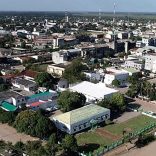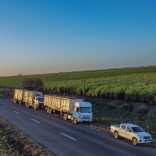Mozambique: UNESCO adds Maputo National Park to World Heritage list
Mozambique committed to reducing carbon emissions

File photo
The Mozambican government has committed itself to a reduction on carbon emissions of ten million tonnes over the next five years through strategies to combat deforestation in the central province of Zambezia.
The pledge is in a letter of intent that the government recently sent to the World Bank, and it was announced on Tuesday in Quelimane, the Zambezia provincial capital, by the Zambezia coordinator of REDD+, Tomas Bastique in a meeting with forestry operators.
REDD+ refers to “reducing emissions from deforestation and forest degradation in developing countries, and the role of conservation, sustainable management of forests, and enhancement of forest carbon stocks in developing countries”.
It is a mechanism under the United Nations Framework Convention on Climate Change which aims at reducing the emissions of greenhouses gases, such as carbon dioxide, largely responsible for climate change, through improving forest management in developing countries.
Bastique told his audience that “the central idea of REDD+ is to reduce deforestation, conserve forests and plant trees to reduce the causes of climate change and contribute to improving the well-being of the local population”.
Zambezia and the northern province of Cabo Delgado have been chosen for the pilot phase of REDD+ in Mozambique. In Zambezia, the programme is being implemented in seven districts – namely Alto Molocué, Maganja da Costa, Mocubela, Pebane, Gilé, Mulevala and Ile.
This results from a World Bank grant equivalent to 3.5 million US dollars for public consultations among local authorities in order to draw up a REDD+ strategy. After approval of the strategy document, Mozambique will be eligible for further funding to implement the strategic activities decided.
Bastique added that the government has submitted an investment plan for approval by the donors’ forum covering the period 2017-2022. This plan would concern measures to implement the initiatives envisaged in the strategy.
Asked why the seven districts had been chosen, Bastique replied this was to ensure continuation of similar projects already under way, such as the MozBio project in the Gile National Reserve.
Bastique said that Mozambique has around 40 million hectares of forest, which is 50 per cent of the country’s surface area. Deforestation is causing the loss of 219,000 hectares of forest a year (about 0.58 per cent of the total).
He pointed to slash and burn agriculture, the use of firewood and charcoal as domestic fuels, and uncontrolled bush fires as among the causes of a high rate of deforestation. But he was convinced that Mozambican has the potential to reduce deforestation, and promote tree planting, thus contributing to mitigating climate change.













Leave a Reply
Be the First to Comment!
You must be logged in to post a comment.
You must be logged in to post a comment.